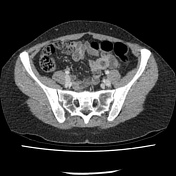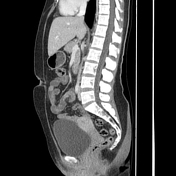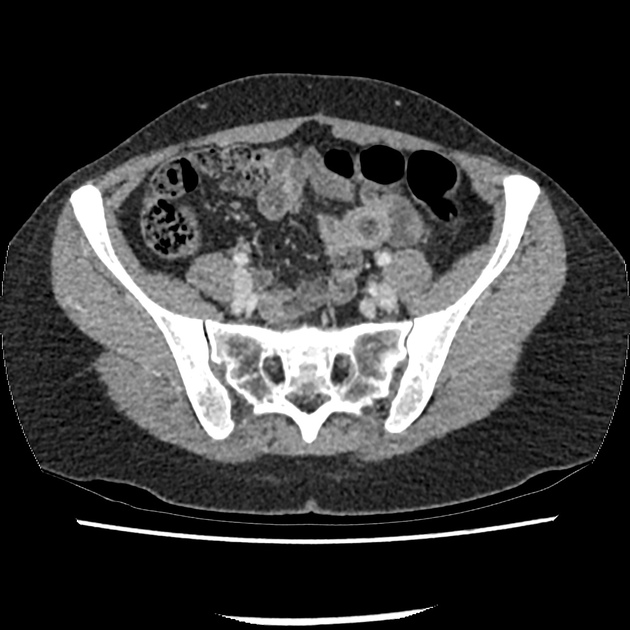Presentation
2 days of vague central abdominal pain. On examination, tenderness centrally, with impression of a mass.
Patient Data







Entero-enteric intussusception with tubular structure arising from mid-small bowel entering the intussusception alongside fat density tissue. No definite mass at the lead point. The remaining bowel appears normal. No signs of bowel obstruction. No free air or fluid. The differential is between a lipoma acting as a lead point (accounting for the fat), or the fat being just the mesentery. Due to the location along the small bowel, a Meckel diverticulum may also be considered.
HISTOLOGY REPORT:
small bowel mesentery
small bowel
Laparoscopy and small bowel resection, intussusception ?secondary to Meckel's diverticulum.
Macroscopic:
fat measuring 50 x 42 x 11mm
small bowel measuring 115 x 30 mm with a diverticulum measuring 50 x 20 mm
Microscopic:
The diverticulum seen macroscopically is composed of ulcerated and inflamed small bowel mucosa. It has an abnormal architecture with the mucosal surface appearing on the external surface. The underlying muscularis propria is disorganized and there appears to be serosal tissue within the lumen. Within the tip of the diverticulum there is heterotopic gastric tissue. The remaining background small bowel is within normal limits. Within the separate small bowel mesentery there are two lymph nodes identified which show reactive changes only.
Overall, the appearances are those of small bowel intussusception secondary to a Meckel's diverticulum. There is no evidence of dysplasia or malignancy.
Conclusion:
Small bowel - Small bowel intussusception secondary to a Meckel's diverticulum.
Case Discussion
The cause of the entero-enteric intussusception was confirmed to be a Meckel diverticulum at surgery. The intussusceptum is formed from the diverticulum, the small bowel it arises from, and some mesenteric fat.
The most common causes of small bowel intussusception in adults are benign abnormalities such as Meckel diverticulum, lipoma, or polyps, although occasionally lymphoma may also be a cause. With adult large bowel intussusception, malignancies are the commonest cause.




 Unable to process the form. Check for errors and try again.
Unable to process the form. Check for errors and try again.